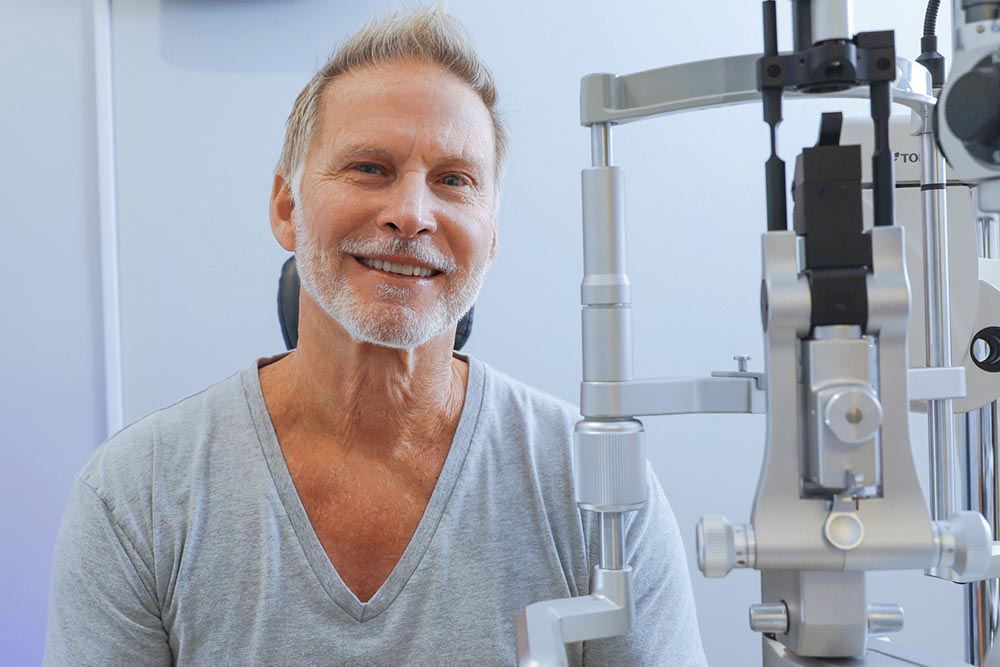General Ophthalmology

The eyes are very complex. For this reason, many parts of the eye must work correctly for you to experience clear vision. At Azure Eye Center, our fellowship trained ophthalmologist has the experience and knowledge to treat a wide range of eye conditions so you can continue seeing your best!
What to Expect During a Routine Eye Exam
To evaluate the health of your eyes and the clarity of your vision, your eye doctor will conduct several tests during a routine eye exam.
To accomplish this, your eye doctor may:
- Test your visual acuity
- Test your peripheral vision
- Examine the health of your retina and optic nerve
- Test your eye pressure
- Test the function of your eye muscles
To inspect the intricate structures of your eyes, your eye doctor will likely use drops to dilate your pupils. The results of these tests will determine whether your eye doctor recommends treatment, prescribes glasses or contact lenses, or conducts further testing.
How Often Should I Have an Eye Exam?
At Azure Eye Center, we begin seeing patients at age twelve. For your first visit, you will need to have a comprehensive eye exam so your eye doctor can get a good understanding of your eye health.
During this visit, your eye doctor will recommend the frequency you should be seen for eye exams. How often you should have an eye exam depends on factors such as your family history of eye conditions, eye health, and age.
Dry Eye
Dry eye syndrome is a common eye condition that is a result of decreased lubrication of the eye’s surface. You may experience dry eye symptoms occasionally throughout life and not have dry eye syndrome.
However, if your eyes are chronically dry, you may have dry eye syndrome and require regular treatment to improve your symptoms and prevent blurry vision. At Azure Eye Center, our fellowship trained ophthalmologist offers a comprehensive and personalized evaluation and treatment plan to help treat dry eyes.
What Are the Symptoms of Dry Eye?
Dry eye syndrome is typically caused by either a lack of tears or a lack of quality tears. Tears are made up of three components: oil, water, and mucus.
If any one of these three components is lacking, your tears will not be able to adequately lubricate the surface of your eyes. Dry eye can cause numerous symptoms, including redness, irritation, tearing, light sensitivity, and blurry vision.
How Is Dry Eye Treated?
To treat dry eye, your eye doctor will first determine the root cause of your symptom. Your eye doctor will likely recommend increasing your use of artificial tears to help keep your eyes moisturized.
In some cases, prescription eye drops may be necessary to reduce inflammation and improve dry eye symptoms. Azure Eye Center also offers additional methods for the treatment of dry eyes, such as punctal occlusion, which closes off the tear’s natural drainage channel so that tears can stay on the surface of your eyes longer.
Your eye doctor may recommend using serum tears, which are specially formulated using your own blood to help improve dry eye syndrome. If you require vision correction, your eye doctor may recommend using scleral contact lenses to improve vision and reduce dry eye symptoms.
Glaucoma
Glaucoma is a group of eye conditions that cause damage to the optic nerve at the back of the eye. Typically, the damage is caused by consistently high eye pressure inside the eyes.
Over time, higher-than-normal eye pressure can damage the optic nerve and cause you to lose vision permanently. Since your eye is constantly creating fluid, the fluid must also leave the eye consistently to maintain healthy eye pressure. If too much fluid is being created or if there is a blockage in the drainage channel, your eye pressure will rise. In order to prevent vision loss and stop the progression of glaucoma, your eye doctor will create a treatment plan to lower the eye pressure.

Diabetes
Those who have diabetes are at risk for eye-related conditions as complications of uncontrolled blood sugar. If you have diabetes, your primary care physician will likely recommend that you visit your eye doctor for routine eye exams to ensure that you are not at risk for diabetic retinopathy or other diabetic eye diseases.
What Are the Symptoms of Diabetic Retinopathy?
The most common symptoms of diabetic retinopathy are:
- Blurry vision
- Missing or distorted vision
- Seeing spots in your vision
- Changes in color vision
If you have diabetes and notice any of these symptoms, schedule an appointment with your eye doctor immediately.
How is Diabetic Retinopathy Treated?
Most of the time, those with diabetes will only need to have their eyes monitored to ensure good eye health. If more invasive treatments, such as laser treatment or injections, are required, your eye doctor at Azure Eye Center will be able to refer you to an appropriate specialist for further treatment.
Macular Degeneration
Macular degeneration is often an age-related eye condition that affects the retina at the back of the eye. The retina is a layer of light-sensitive tissue that gathers information from the light so you can see.
What Are the Symptoms of Macular Degeneration?
The most common symptom of macular degeneration is blurred vision. Here are some of the other common symptoms of macular degeneration:
- Straight lines appearing wavy
- Distorted vision
- Difficulty seeing in dim light
- Seeing spots in your vision
- Missing vision
Macular degeneration is very common in people over the age of fifty. If you are experiencing these symptoms, schedule an appointment with your eye doctor at Azure Eye Center immediately.

How is Macular Degeneration Treated?
The best way to prevent vision loss from macular degeneration is through early detection. At Azure Eye Center, your eye doctor will evaluate and monitor your eyes at your annual eye exam for signs of macular degeneration.
Depending on the severity of the eye condition, your eye doctor may only recommend that you take vitamins to slow the progression of macular degeneration. If more invasive treatments, such as laser treatment or injections are required, your eye doctor at Azure Eye Center will be able to refer you to an appropriate specialist.
Is it time for you to have an annual eye exam, or are you experiencing symptoms of an eye condition? Schedule an appointment at Azure Eye Center in Ft. Worth, TX, today to keep your vision and eyes healthy!
Request A
Consultation
To request a consultation with Azure Eye Center, please click link below.


